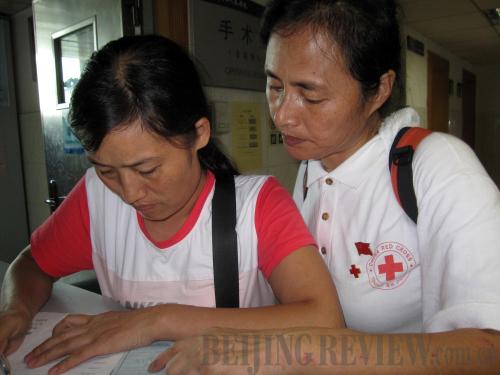|
 |
|
GOOD DEED: Gao Min (right), an organ donation coordinator in Shenzhen, assists a mother as she signs an agreement on May 9, 2012 to have her 11-year-old son's organs donated following his death in a traffic accident (XINHUA) |
Around an exuberant and gigantic banyan tree in Jitian Cemetery in Shenzhen, south China's Guangdong Province, is a special plot reserved as the final resting place for more than 20 people who have posthumously donated their organs since 2006, including a two-year-old boy who drowned and several young victims of traffic accidents.
Gao Min is a frequent visitor to the graveyard. She coordinated the organ donations and made sure that even as their lives ended, others might be given a second chance.
She became a coordinator for the city's organ donation pilot program in 2005 when she was a volunteer for the Shenzhen branch of the Red Cross Society of China (RCSC). Before that, she was already famous in the city for donating blood more than 100 times.
Born in rural Shandong Province, Gao came to Shenzhen in 1997 to take care of her niece while her younger sister worked. That year, she donated blood for the first time at a mobile blood bank while on the way to a grocery store.
As a volunteer organ donation coordinator, she has successfully coordinated 87 organ donations in the past eight years, more than any other coordinators in the country.
A challenging job
Currently, there are 332 organ donation coordinators all over the country, said Gao Xinpu, deputy head of the Business Department of China Human Organ Donation Management Center. The center was jointly launched on July 6, 2012, by the RCSC and the then Ministry of Health to oversee organ donation at the national level.
Most coordinators went into this role after an organ donation program was piloted in 19 Chinese provinces in March 2010. As of February 22, coordinators had helped 659 donors contribute 1,804 organs, according to the RCSC, which has been entrusted with organ donation administration.
In February, Zhao Baige, Executive Vice President of the RCSC, urged the expansion of the pilot program to all provinces and regions by the end of the year.
Under the current program, when first-line doctors identify a potential organ donor, usually a fatally ill or brain-dead person, they should contact an organ donation coordinator, who will communicate with the potential donor or his or her family members to persuade them to donate the person's organ after the person's death.
A coordinator's responsibility is to interpret relevant government policies and provide necessary knowledge, yet they cannot induce donations, said Gao.
China is facing a shortage of human organs for transplant. Official statistics show that about 300,000 patients are waiting for surgery each year, but only 10,000 receive such operations.
Traditional beliefs make Chinese people hesitant to donate organs. Many believe bodies should be kept intact even if they are to be cremated. It is also considered inauspicious to ask a healthy person about posthumous organ donation.
Objections from family members are a formidable challenge for Gao. Once, the parents of a girl fatally injured in a traffic accident contacted Gao, and signed an agreement to donate the girl's organs. Days later, the parents called again saying the girls' grandparents strongly opposed.
"In such case, we will respect the decision of potential organ donor's family, even if organ recipient is waiting at the operating table at another hospital," Gao said.
| 